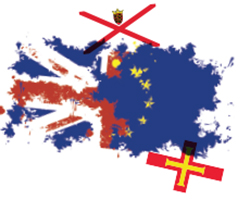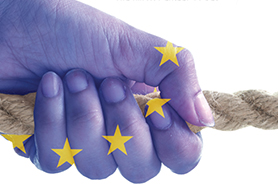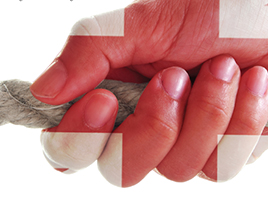 One year down and one year to go, how are the Channel Islands preparing for the UK leaving the EU? and what’s the impact likely to be?
One year down and one year to go, how are the Channel Islands preparing for the UK leaving the EU? and what’s the impact likely to be?
Well, we’re halfway there. Having triggered Article 50 in March 2017, the UK is now just 12 months away from actually leaving the European Union. At 11pm on Friday 29 March 2019, Big Ben will toll to mark ‘Brexit’… if the bells are back in service by then.
Actually, that’s not entirely accurate. What will happen in March 2019 is that a two-year transitional period for the UK to properly exit the EU will begin. For that to happen, a withdrawal treaty and transition deal must first be ratified by EU nations and the UK government.
So, between now and March 2019, politicians will be frantically discussing issues such as whether the UK has to remain within the Customs Union and the single market during the transition period. And only when the transition deal is ratified can discussions on the UK’s post-Brexit position actually begin.
What’s been agreed already are the terms of the UK’s ‘divorce settlement'. There are three key elements here – there will be no hard border between Northern Ireland and the Republic; the rights of UK citizens in the EU, and vice versa, will be protected; and the UK will pay between £35bn and £39bn to leave.
Obviously, the Brexit negotiations are massive, and it would be easy to accuse the government of making a bit of a meal of it all. David Davis, the Secretary of State for Exiting the European Union, looks as if he’s aged about 100 years since the negotiations began. But this is the biggest constitutional change the UK has faced since the Second World War. Negotiations were always going to be tough.
“The government’s done a better job at making progress on some of the key withdrawal issues, and moving the discussion on to getting a political deal on transition by the end of March this year,” says Allie Renison, Head of Europe & Trade Policy at the Institute of Directors. “However, we’re in real need of much more clarity about government objectives for the long-term end-state relationship with the EU.”
 Channel Island reaction
Channel Island reaction
In the Channel Islands, industries and politicians are keeping a close eye on progress. In January, Sir Philip Bailhache, Jersey’s Minister for External Relations, lodged a new Brexit law, which will allow the States to decide which EU legislation will continue to apply in Jersey. It also gives States Ministers powers to amend existing legislation, if it’s adversely affected by Brexit.
“This draft law is the essential first step in the legal measures that Jersey will need to implement as a result of Brexit,” says Senator Bailhache.
“We’re taking a substantially different approach to the UK in bringing this draft law. Whilst the UK is implementing all existing EU legislation that applies to it in one law, we’re creating the ability for the island to carefully select which pieces of EU legislation it wishes to keep.”
The States of Guernsey has taken similar steps. In November 2017, the ‘Protecting the interests of the Bailiwick of Guernsey as the UK leaves the EU’ policy letter was passed, giving Ministers similar powers as their Jersey counterparts when reacting to Brexit-related law changes.
A question of finance
From a regulatory and political perspective then, it would appear that the islands are well placed. But what of their biggest contributing industry, finance? “I can’t imagine huge change for financial services, because they’ve always traded as a third country with Europe,” Allie Renison explains.
“The Channel Islands are early voluntary adopters of a lot of EU financial services regulation, which may be how the UK also approaches life outside the single market for financial services after Brexit.”
And people are still attracted to the islands as a place to do business. As James Gaudin, Corporate Partner at Appleby in Jersey, points out: “We’ve seen strong deal flow, particularly US clients coming to the Crown Dependencies looking to execute trades. They’re suddenly thinking: ‘The islands are pretty well established, there’s good infrastructure, there’s good ancillary services. There’s good substance – why don't we base something here?’.
“Fintech is another area where we’re seeing good deal flow – West Coast US businesses looking to establish their technology outposts here. You look at the infrastructure and that’s what’s attracting them – it’s not really the tax-planning scenario.”
It’s too early to tell, of course, but is there a sense that Brexit could actually be a good thing for the islands? “We are, and always will be, a complementary asset to London City plc,” says Andy Sloan, Acting Director of Strategy at Guernsey Finance.
“Yes, you’ve got huge uncertainty. Yes, you’ve got those tectonic plates both in London and Brussels. But what you have in the Channel Islands is a lot of security and stability. You have a jurisdiction that conforms to the development of international standards, is seen as well regulated, and can strategically assist the UK in its pivot to the rest of the world.”
 Business survey
Business survey
In December 2017, the States of Jersey published its Brexit Business Survey, which was completed by local businesses from financial and non-financial backgrounds. Two-thirds of respondents thought the overall impact of Brexit on their business would be neither positive nor negative, while only six per cent felt Brexit could lead to businesses considering a move away from the islands – a view echoed by Appleby’s Gaudin.
“There’s always potential – we’re in constant competition with other countries, on and offshore. But my feeling is Brexit will be beneficial to a jurisdiction like Jersey, and others, which are ‘substance’ jurisdictions.”
And what of claims the islands could push for independence from the UK? “I guess, never say never,” Gaudin continues. “But it seems like a bridge too far to me.”
This will be a massive year in the Brexit discussions. By the end of 2018, we’ll know a lot more about how the transitional period will work, and maybe even what sort of Brexit the UK will get. In the Channel Islands, there’s a sense that business and government are as prepared as they can be for March 2019 and beyond.
“Uncertainty creates opportunities,” Sloan says. “For us, it’s about maintaining our position as a secure jurisdiction offering sophisticated, specialist services. It’s about getting the message across that we bring trillions of capital into the UK, and help the UK pivot to the rest of the world in its trading activity.”
Brexit at the coal face
While financial services companies seem positive on Brexit, those in the tourism, hospitality and agriculture sectors aren’t so optimistic.
As Mark Crowther, CEO of Liberation Group, says: “The impact on UK business from Brexit will roll down to the Channel Islands. Certainly, a lot of our wine suppliers are very concerned about getting stock into the UK. What they don’t want is lots of paperwork and bureaucracy, with stock getting tied up at Dover and Calais. There are also issues like import tariffs. What’s going to be lumped onto a bottle of French wine, for example?”
While freedom of movement issues seem to have been appeased by the Brexit divorce bill, the flow of people from Eastern Europe to the Channel Islands for work seems to have slowed. “If you’re coming from Romania or Hungary, you can go and work in Germany or France and immediately earn 15 per cent more than you’d earn over here, with the devaluation of the pound against the euro,” Crowther continues.
It’s enough to turn one to drink, isn’t it. “But you know what?” Crowther concludes, defiantly. “Business people get their heads down and get on with it. Pubs will still be trading and we’ll still be selling beer.”